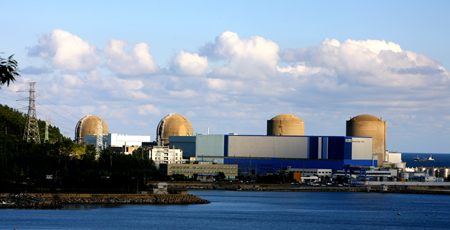‘Gori No. 1 reactor is safe to operate’

The Gori No. 1 nuclear reactor in Busan has been the subject of safety debates in recent months. (Photo : The Korea Times)
The No. 1 reactor of the Gori nuclear plant in Busan should resume operations to meet surging electricity demand amid the scorching heat wave gripping the nation, according to the state-run operator of Korea’s 21 atomic reactors.
There has been a growing call for the reactor to be made operational in order to prevent the repeat of last September’s nationwide rolling blackout.
Korea Hydro & Nuclear Power (KHNP) said the 34-year-old reactor was declared safe in 2007 by both Korean and non-Korean nuclear experts and that it is allowed to operate through 2017.
Korea’s first atomic power plant was supposed to stop running in 2008, 30 years after its commercial operations started. It was reactivated after state approval with a fresh timeline of 2017.
However, the Gori No. 1 reactor suffered a temporary shutdown after a circuit-breaker burned out because of an electricity overload in April 2011, a month after the meltdown of Japan’s Fukushima nuclear reactor. It was the first malfunction at the facility since 2005.
It then remained closed for a month even though it was able to resume operations because of growing public concerns over nuclear safety.
Following an extensive inspection, the Gori plant began generating electricity again in May last year. But it again halted production on March 13 this year due to a power failure and has remained idle ever since.
“It is unfortunate that the Gori reactor has suffered a series of malfunctions over the past year. But it has been cleared of any safety concerns and we think it should generate electricity to meet soaring power demand this summer,’’ a KHNP official said. “But to ease any public worries, we will not resume operations until the public is convinced of its safety.’’
The Nuclear Safety and Security Commission inspected the reactor in May and June. The International Atomic Energy Agency (IAEA) also sent an eight-member team to check it from June 4 to 11.
“The reactor received a green light from the IAEA. It also said emergency generators and other equipment installed there were all sound. We asked the international organization to look at the facility because the Busan Municipal Administration and residents do not trust us,’’ the official said.
He added that the local government and residents are still not convinced of the plant’s safety. “It is just unfortunate that they hold a deep distrust of the nuclear reactor, despite all the scientific evidence that suggests otherwise.’’
The official said opponents should approach the issue from a scientific perspective, adding they need to shake off the unfounded, vague fear of nuclear energy for the sake of national interests.
KHNP has said nuclear energy is a safe and affordable way to generate electricity, stressing it is highly unlikely that Korea will ever be hit by an earthquake as strong as the one that struck Japan’s northeastern coast in March 2011.
It plans to increase the portion of electricity generated by nuclear plants to 41 percent of the country’s total power demand by 2030, up from 23.3 percent in 2010. <The Korea Times/Lee Hyo-sik>

























































